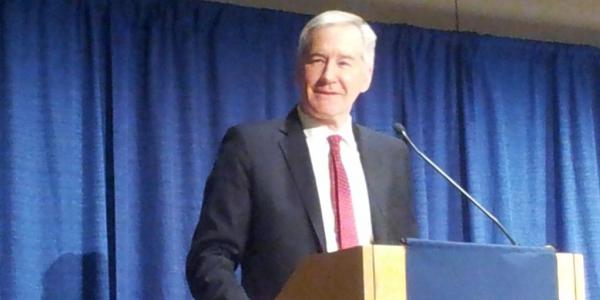DHS Continually Improving for the Mission's Sake
The Department of Homeland Security (DHS) may sometimes seem like a confused teenager, but it is growing and maturing and striving to make the country stronger, reports Russell Deyo, the DHS undersecretary for management.
Deyo, this morning’s keynote speaker at the 2016 AFCEA Homeland Security Conference in Washington, D.C., told the audience the DHS is focused on four primary areas for change. Those areas include: strengthening resource allocation; enhancing delivery of mission support capabilities through acquisition excellence; developing and deploying secure technology; and recruiting, retaining and developing talent.
On the fourth point, Deyo emphasized the need to continue building the department’s cybersecurity work force. He said the DHS is lucky in that its mission is a compelling one for cyber professionals. That mission compelled Deyo himself to come out of retirement when he received a call from DHS Secretary Jeh Johnson. “I’m here because of the mission. The mission is so meaningful,” he said.
Deyo struck a personal note when he offered his own memory of the September 11, 2001, terrorist attacks, when he was working for Johnson and Johnson. “At Johnson and Johnson headquarters, the only buildings you could see on the New York skyline were the World Trade Center buildings,” he said, revealing that he had two neighbors killed that day. “That’s why I’m here.”
He also discussed the changing threat, which now includes cyber and home-grown, lone-wolf terrorism, such as the mass murder in Orlando. The department, and the country, deals with those kinds of attacks through cooperation, he said. In that particular case, the FBI, local law enforcement, non-profits and individual citizens all cooperated to respond to the Orlando tragedy and to prevent similar attacks.
He also stressed the department’s continuing efforts to improve communication and collaboration across the DHS as well as with other agencies and with industry. He touted the benefits of reverse industry days, where rather than DHS officials presenting their needs to industry, they allow industry to air their grievances, stress their own needs and offer lessons learned. “DHS touches more citizens than any other department. Collaboration is how we succeed,” he said.
He also mentioned the Flexible Agile Support for the Homeland (FLASH) program, which seeks innovative methods and industry best practices to acquire agile design and development support services. DHS aims to establish an agency-wide contract vehicle to provide DHS headquarters and its components with agile design and development support services.





Comments